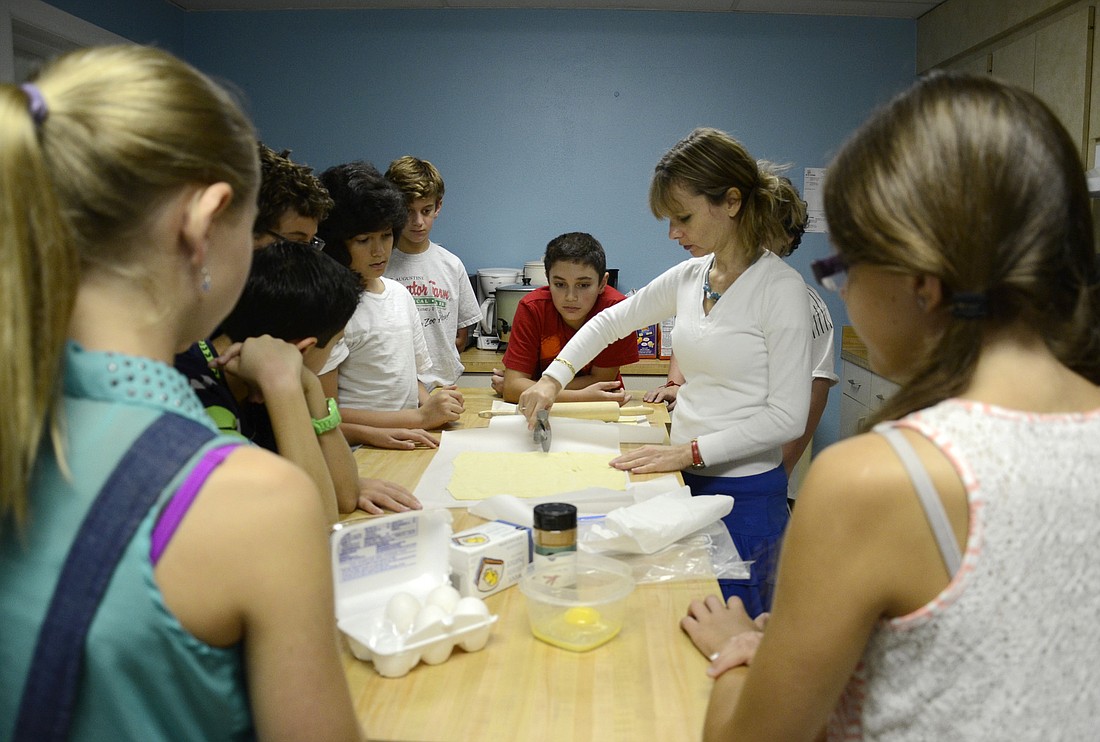- April 23, 2024
-
-
Loading

Loading

After moving to Sarasota 10 years ago from Belgium with her family, Lesley “Mora” Lempel immediately got a taste of local Jewish culture and offerings. Every week, Temple Emanu-El offers enrichment classes, such as cooking and Israeli dancing. After about two years, Lempel was put in charge of teaching the cooking class.
Lempel’s experiences as the daughter of a Holocaust survivor and a 13-year resident of Israel make her a welcome addition to temple education classes, said Sabrina Silverberg, director of education.
One of Lempel’s goals is to encourage her students to try something new and take a participatory role in the kitchen. Lempel said she’s noticed American children are not encouraged to taste new things. When children are allowed to participate in making something, they are excited to taste the food.
“They love to taste; they love to eat,” Lempel said.
Her class makes enough samples for each person, as well as a limited amount for other students in the religious school to try. Kids were lined up outside of the kitchen doors after the cooking hour was over on a recent Sunday; they were eager to snag a piece of chocolate rogulach, a typical Jewish dessert served in Central and Eastern Europe.
While teaching, Lempel introduces Hebrew words to the students, such as the names of the food and how to say different ingredients. The repetition and the inclusion of the Hebrew language in tasks such as cooking help the students remember the words, she said.
“I love teaching,” she said. “I love seeing the curiosity. I love seeing their faces when they taste.”
Lempel said she would like to expand her recipes to other Jewish families by starting a broadcast TV show. Because she has traveled to several countries filled with different styles of Jewish cooking, she’s familiar with recipes that other families may not be, she said. One Asian-inspired dish she hopes to show her students how to make is fried rice with chicken and oyster sauce.
“There are Jewish people everywhere,” Lempel said. “I try to introduce something from all over the world.”
Rosh Hashana
Meaning: Jewish New Year
Begins: Sunset Sept. 24
Ends: Nightfall Sept. 26
Traditional food eaten: Apples or challah, a kind of bread, dipped in honey. It is a symbolic gesture of a wish for a sweet new year.
Chocolate Rogulach
Ingredients:
• 2 sheets pastry dough (recommended: “Puff Pastry” by Pepperidge Farm)
• ¼ cup cocoa
• ¼ cup sugar
• 1 egg
• 1 tablespoon butter (room temperature)
• 2 tablespoons water
• (optional) 1 teaspoon vanilla extract or cinnamon, to taste
Directions:
• Preheat oven to 400 degrees.
• Unroll dough sheets. Using a rolling pin, thin out the dough. Using a pizza cutter, cut each sheet in half. Cut each half into long triangles.
• Mix cocoa, sugar, butter, water and optional cinnamon or vanilla until well mixed.
• Spread chocolate mix onto the triangles. Roll dough into a croissant shape by starting at the wide end of the triangle.
• Place onto parchment paper on a baking sheet, leaving space between each rogulach.
• Whisk egg and brush it on the top of each roll.
• Bake for 15 to 20 minutes.
Now she’s cooking
September 14 was Shelby Savitz’s first experience in Lesley “Mora” Lempel’s kitchen.
Shelby listened attentively to the teacher’s instructions and was quick to volunteer for any activity — from rolling the rogulach to cleaning the workspace.
“It’s fun to help out, and it’s a good idea to teach kids how to cook,” Shelby said.
Her favorite part of the class was watching the younger kids race to the kitchen to sample the pastry she helped make.
“The eating’s the best part,” she added.
The 11-year-old is no newbie to the kitchen. She and her mom, Paula, cook together often. Paula said she is not as familiar with the Hebrew language, but that Shelby, who is learning Hebrew at Temple Emanu-El, likes to incorporate the language into the kitchen.
Participating in the cooking class helped Shelby learn more Hebrew words, such as how to say sugar (sukar) and butter (chemah).
“I really enjoyed it,” Shelby said.